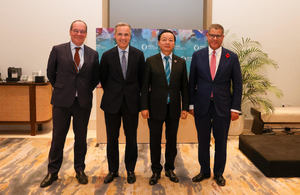Thank you, Mr Chair. In recent weeks, the UK and others have come to together to condemn Russia’s attacks on Ukraine’s civilians and critical national infrastructure. Sadly, this week we must again call out these attacks and Russia’s appalling lack of respect for human life.
Russia’s systematic targeting of energy infrastructure since 10 October has resulted in damage to over 400 energy facilities, affecting around 4.5 million people. Combined with the targeting of hydroelectric dams and reports of damage to vital water supply infrastructure, countless civilians have been left for prolonged periods without electricity and water.
The purpose of these attacks is clear. Russia is seeking to instil fear and disrupt the lives of innocent civilians, plunging millions into darkness and denying access to fundamental necessities such as heating and clean water.
As civilians continue to suffer at the hand of President Putin, Ukraine’s health care system has shown tremendous resilience. However, it is under increasing strain from the massive power outages and from regular attacks on healthcare facilities and healthcare workers – as of 7 November, the World Health Organisation reports 580 verified attacks on healthcare facilities and an estimated 14.5 million people in Ukraine in need of health assistance.
Mothers are giving birth in hospital basements and makeshift facilities, whilst shelling and drone attacks continue around them; oncology centres providing life-saving care for cancer patients have been destroyed; and hundreds of health professionals have been killed or injured. Accessing essential services is becoming more and more challenging for a growing number of people, in areas of active conflict and those living under temporarily Russian-controlled areas, where a third of Ukrainians are unable to get the medicines they need.
No healthcare professional should have to deliver care in these terrible circumstances, but this is what nurses, doctors, ambulance technicians and medical teams are doing on a daily basis. Healthcare facilities, and their staff, must be protected. Intentionally directing attacks at civilians and civilian infrastructure, including health care facilities, violates international humanitarian law. Russia knows its attacks will impact the most vulnerable. It is morally bankrupt, and it must stop immediately.
Mr Chair, the contempt Russia has shown for human life is inexcusable. Evidence of Russia’s horrific treatment of the Ukrainian people is mounting, including in relation to Russia’s use of ‘filtration’. A Human Rights Watch report, outlining the systematic nature and scope of the filtration process inflicted upon thousands, describes it as “punitive and abusive”. The report also notes that those individuals that ‘fail’ the filtration process are at risk of grave harm, including torture or other ill-treatment. The practice is barbaric.
We continue to see horrific reports of the treatment of prisoners of war in temporarily Russian controlled areas. The UN Human Rights Monitoring Mission in Ukraine has documented that prisoners of war in temporarily Russian controlled areas have suffered torture and ill treatment; some detention facilities lack adequate food, water, healthcare and sanitation. The situation in the penal colony in Olenivka is particularly dire, with prisoners reportedly suffering from infectious diseases, including hepatitis A and tuberculosis. Mariana Mamonova, a military medic, described how she was held in Olenivka for six months while pregnant, where they denied her access to healthy food, fresh air and threatened to take away her baby.
We remind Russia again of its obligations under the third Geneva Convention – that all prisoners of war should be treated humanely, afforded appropriate medical treatment and basic necessities, and be protected from humiliating and degrading treatment. Those responsible must be held to account for any violations.
Mr Chair, we remain in awe of the bravery and resilience of the Ukrainian people in the face of Russia’s unprovoked aggression. The UK is proud to support the OSCE’s Support Programme for Ukraine in its efforts to combat some of the immediate challenges to civilians posed by the war. We and the international community will not let Ukraine face these challenges alone. We will stand by Ukraine now and until Ukraine prevails.

